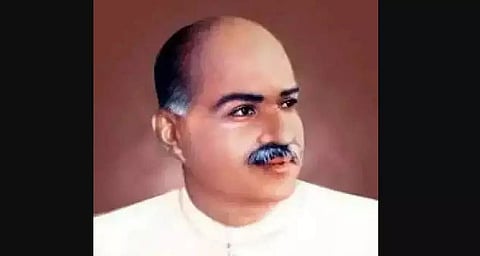
- Home
- Live Blog
- Breaking News
- Top Headlines
- Cities
- NE News
- Sentinel Media
- Sports
- Education
- Jobs

The leader who gave the famous clarion call: “Ek desh mein do Vidhan, do Nishan nahin chalege, nahin chalege (Two Constitutions and two flags in one country are not acceptable) One of the founding fathers of independent, sovereign India, Dr. Syama Prasad Mookherjee was a patriot, educator, parliamentarian, statesman, humanitarian, and above all, a campaigner for national unity and integrity.
It is impossible to find another great leader as great as Dr. Syama Prasad Mookherjee, the man who risked his life, his future, and his ministry position and braved all odds to protect and unite India, from Kashmir to Assam. He was strongly against the partition of India. He considered it a very dangerous and disquieting development and fought tooth and nail for a united India. He bent his energies to save the majority of Punjab and Bengal during partition. He organised a countrywide campaign against the partition of the motherland, and thus, it was due to his efforts that half of Punjab, half of Bengal, and half of Assam were retained within India. Importantly, after independence, he fought till his last breath for a united Kashmir.
Saviour of Assam
Around partition times, Assam was a group-C state and was supposed to be a part of East Pakistan. Dr. Mookherjee knew the consequences the Assamese people would face if Assam was allowed to be part of Pakistan, now Bangladesh. He strongly voiced his opinion and made every effort to save Assam and prevent its inclusion in the partitioned part given to Bangladesh. Great freedom fighter Shri Pushpalata Das said that Assam could not have been saved from being merged with East Pakistan by Shri Gopinath Bordoloi alone if Dr. Mukherji did not actively voice out, strategize, and fight for retaining Assam in India. If we are happily living a secure, peaceful life in Assam today, we should be thankful and grateful to him. Otherwise, we would have been on the other side of borders and would have been only 8.5% of the surviving Hindu population instead of 79.8% of India. He, thus, came as a life saviour.
Even previously, Dr. Syama Prasad Mukherjee travelled to several parts of Assam. He stayed here, experienced the Assamese lifestyle, and worked for the unity of Assam. He advocated for the Assamese language to be the official language of the state. Such was his love and affection for the Assamese language that he wanted to promote it extensively and made efforts towards it. As soon as he became VC of Calcutta University in 1935, he introduced the Assamese language. He wanted that the people of India should appreciate and learn Assamese so as to know about the history of Assam, the state’s great and brave kings, have a sense of the past, community lifestyle cuisine, traditional industry, economics, art culture, and the contribution of Assam and Assamese people towards our freedom struggle. He selected Birinchi Kumar Barua, the first Assamese, as a teacher at Calcutta University to teach the Assamese language.
Parallely, he urged every citizen of Assam, whichever region, religion, or community they come from, to learn the Assamese language and experience and feel the beauty of the language just as he did. He knew that more assimilation and affinity could be developed by knowing the language and learning to speak it. Speaking the Assamese language by all communities of Assam will create more positive attitudes, bonding, and less prejudice towards people, and definitely strengthen relationships.
Uniting Kashmir
Dr. Mookherjee was no ordinary leader but a man of great foresight who knew the dangers ahead if Kashmir was allowed to have a different constitution and different laws. He opposed Article 370 and separate rights for Kashmir, different from India. He opposed the Nehru-Liaqat Pact of 1950, and not being able to prevent that pact from being signed, he left the cabinet of the Congress government, yet a forced amendment in the first original draft of the Agreement, which committed GoI towards reservation of seats for Muslims in legislatures and services, was modified to eliminate these provisions. After leaving the Congress, Dr. Syama Prasad returned to the first Lok Sabha in the first general elections held in 1952 under his newly launched party. The Bharatiya Jan Sangh, and in spite of having only two members, he stood head and shoulders above all others with a towering personality. He strongly opposed Article 370 and fought against it. He also launched the first satyagraha on the issue in the post-Independence era, which attracted a huge number of people, for which he was arrested and illegally jailed, which later led to his death under mysterious medical circumstances on June 23, 1953, in Srinagar.
Dr. SP Mukherjee was a true son of mother India, a true nationalist, and a true patriot. His principles and thoughts were beyond any personal ambition. He always thought of India, lived for India, and finally died for India.
Very few know that he was also exceptionally intelligent, a meritorious student, and a politician par excellence with top positions and rankings, and he has many firsts to his credit during his student years. He was also a great humanitarian, and his role during the Bengal Famine and his untiring effort to save lives can never be forgotten. Born on July 6, 1901, in Calcutta, he became a legend in his lifetime.
There are many who divided our nation, but there are few who fought till their last breath to unite our partitioned nation. He had a genuine interest in keeping a nation united and strong. Among the galaxy of freedom fighters, it was Dr. Syama Prasad Mukherji. He shines like a big star. We celebrate his death anniversary as Balidan Diwas.